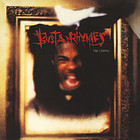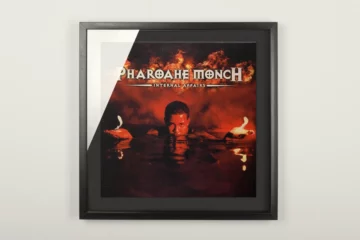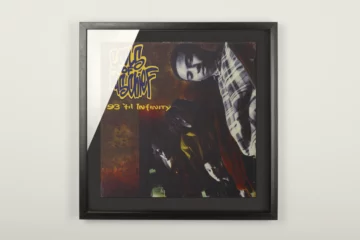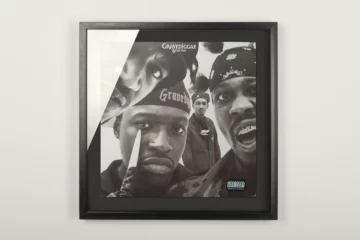As one of the three rappers from Leaders of the New School, the voice of Busta Rhymes already featured on their debut album »A Future Without A Past…« in 1991, but in this country in particular, most hip-hop fans will have heard his lion-like voice for the first time a year later on »Scenario«, the Posse Cut released as a single from »The Low End Theory«, the second album from A Tribe Called Quest. It was Trevor Tahiem Smith Jr., born 1972 in East Flatbush in the New York borough of Brooklyn as the son of Caribbean immigrants and raised in Long Island, who took over the microphone in the last quarter of the track, which was already relatively heavy by ATCQ standards, and crowned the turbulent events with his hyperactive performance. Once you’ve heard this »Rrrrroaw rrrrroaw like a Dungeon Dragon!«, you’ll never get it out of your mind again. Although the Leaders of the New School released a follow-up album, »T.I.M.E. (The Inner Mind’s Eye)« in 1993, the chemistry was irreparably destroyed. While Busta Rhymes’ popularity curve climbed steeply, the interest in his fellow MCs Dinco D. and Charlie Brown remained within manageable limits – today their names are almost forgotten. In contrast to Busta Rhymes. With »Extinction Level Event 2: The Wrath of God«, Smith released his tenth solo album in the autumn of 2020, which did not quite match his platinum successes in the 90s and early 2000s, but still reached number 7 in the US charts.

The Coming
When Busta Rhymes’ solo debut was released 25 years ago with »The Coming«, he was already a star. A Tribe Called Quest called upon his offensive qualities again for »Oh My God«, the second single from their album »Midnight Marauders«, and his distinctive roaring verses could also be heard on Craig Mack’s »Flava in Ya Ear« and the accompanying remix. What elevated Busta Rhymes to the rank of an innovation at the time was that something came to the fore in his flow that actually belongs to hip-hop’s roots, but had remained relatively hidden until then: the toasting of the Jamaican deejays resonates in his specific handling of the verse meter, which he employs more flexibly than the comparatively still static meter-oriented vocals of other rappers of the time. Hardly anyone in hip-hop in the mid-90s rapped as closely to the style of dancehall performers as Busta Rhymes.
Busta Rhymes stayed true to his name on »The Coming« as he owes his name to the play on words, which according to legend was given to him by Chuck D – »to bust a rhyme« means »to deliver a cool rhyme« in hip-hop slang. Especially »Woo Hah! Got You All In Check«, probably his biggest hit to date, in which a visually exuberant Hype Williams video may have played a decisive role – music television à la MTV at the time was what YouTube is today – is still beyond reproach. Busta Rhymes’ manic delivery, which starts out with his characteristically angular phrasing and then gets increasingly out of hand in a well-calculated way, the chorus based on an interjection borrowed from Sugarhill Gang’s »8th Wonder« over the piano melody of Galt MacDermot’s »Space« and the crisp beats of Rashad Smith, plus the ad-lib from a nursery rhyme from the turn of the century before last, form a combination that is as surprising as it is compelling.
Busta Rhymes’ manische delivery, die erst in seiner charakteristisch eckigen Phrasierung ansetzt, um dann gut kalkuliert zunehmend aus dem Ruder zu laufen, haben auch heute noch Wirkung.
Remarkably resolved then the track, »It’s A Party« that follows with the R&B vocal duo Zhané, which after »Woo Hah!!! Got You All In Check« was released as the second single. Easy Mo Bee’s bone-dry drum beats and a lilting jazz sample reminiscent of Miles Davis’ »Bess, You Is My Woman Now« make »Everything Remains Raw« one of the most enduring highlights here, surpassed only by »Ill Vibe«, on which Smith not only shares the microphone with Q-Tip, but also leaves the musical part to the ATCQ rapper as a member of the producer trio The Ummah together with Ali Shaheed Muhammad and J Dilla – a track that would have made an excellent addition to »Beats, Rhymes And Life«. In »Flipmode Squad meets Def Squad«, Jamal, Redman, Keith Murray meet Rampage and Lord Have Mercy, who operated with Busta Rhymes under the first crew name. At the distance of a quarter of a century, it is important to realise that not all the 13 tracks on »The Coming« have aged equally well. »Keep It Movin’« with the former homies of Leaders of the New School fails to captivate despite J Dilla’s beats, the same goes for »Still Shining«. The intro »The Coming« and the outro »The End of the World« seem pretentious and smug from today’s perspective, the hood and sex skits superfluous, not to mention the Y2K allusions. In 1996, there was no getting around »The Coming« for hip-hop fans. But it was not quite enough to become a timeless masterpiece.









